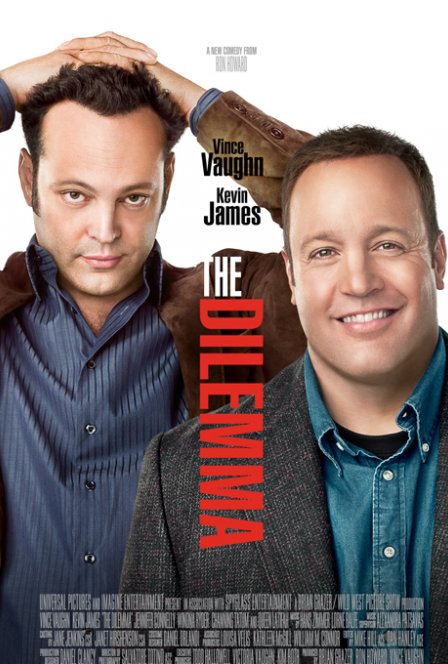Partners in a startup auto design firm, Nick Brennan (Kevin James) and Ronny Valentine (Vince Vaughn) have what appears to be the perfect working relationship: Nick is the brilliant “idea man,” devoting his every waking hour to the pursuit of his egg-headed research; and Ronny is the smooth-talking “action man,” a gifted salesman and all-around liar. But Nick’s obsessive devotion to the perfection of Ronny’s and his latest venture — a hybrid/electric engine that buzzes and whirs like that of an old Dodge muscle car — has led to some difficulties in his marriage. And given his slippery and easy-going nature, Ronny can’t bring himself to finally “pop the question” to his longtime girlfriend, Beth (Jennifer Connelly). When he’s finally worked up the courage to propose, Ronny makes a shocking discovery: Nick’s wife, Geneva (Winona Ryder), has been cheating on him with a younger and (somehow) better-looking man named Zip (Channing Tatum). To simply relay the crushing news to his partner could mean the combustion of their tenuous deal with the Chrysler Group! This is The Dilemma.
Although its plot is advanced by, in most cases, embarrassingly contrived convolutions and coincidences, the central conflict of The Dilemma is a strong one, as it derives from organically conceived relationship dynamics: Nick is not merely cuckolded because this is what the plot “needed”; he is, like many of literature’s great monomaniacs, largely inaccessible to his wife, both sexually and emotionally. Ronny may be something of a grown-up kid, but his naiveté is something of an occupational necessity: he excels at pitching unrealistic goals and deadlines because he may not fully understand their implications. To this end, screenwriter Allan Loeb makes use of an amusing series of football analogies, resulting in one of the film’s funniest sequences. But, predictably, it is more often Vaughn than Loeb who threatens to compromise the structural integrity of “Ronny.” The Dilemma finds the actor playing an actual “character” for the first time in his career, and while Vaughn’s mannered, self-consciously “detail-oriented” shtick is, even after 15 years, still worth a few laughs — in one particularly bathetic scene, he even manages to wring a few tears out of some of the weaker audience members — he simply cannot “do” serious. Some of the film’s more embarrassing moments involve the actor’s attempts at rage, which may be a slightly too ambitious leap for him.
Among the subtler devices at Loeb and director Ron Howard’s disposal: a tense argument between Ronny and Nick over the latter’s abilities as a hockey player, situated immediately after Ronny’s terrible discovery, suggesting that each suspects the other of withholding pertinent information — in Nick’s case, that he may not reach an unrealistic deadline. But once their mutual trust is restored, the film is concluded with Nick proving his worth in one of those “fan shoot-offs” at a hockey game, signifying a successful reconciliation; in another scene, Ronny, while riding a train, still outraged by Geneva’s infidelity, is blatantly hit on by an attractive young woman: his nervous response intimating that he may relate to Geneva. And it is rare to see rendered so maturely and frankly in the average Hollywood Buddy Film a discussion of such a thing as justifiable marital infidelity. However, the film’s final act seems to give the lie to all of this: far from sympathetic, Geneva sets out to blackmail Ronny into withholding the truth and saving her much reviled marriage — explanation: never given — and Ronny sinks increasingly deeper into an unhealthy obsession with Geneva and Zip’s dirty paramour, thereby compromising his own relationship with the beautiful, neglected Beth.
Many viewers may be confused by Howard and Loeb’s technique. They make a very strong case for the operative hypocrisies of marriage but, in time-honored Hollywood tradition, magically transform the “cheater” Geneva into a monster and destroy her marriage, even though there’s far more evidence to suggest that the absentee Nick is the “bad guy”; Beth is given no end of justification for leaving the unreliable, self-involved, sanctimonious and mentally unstable Ronny, or at least keeping him at arm’s length, but she decides to marry him just hours after he wrecks her parents’ 40th wedding anniversary and behaves cruelly towards her cousin. Although we eventually learn that Ronny is a recovering gambling addict, it’s unclear why he becomes so pathologically invested in Geneva’s affairs — unless that was it — and it’s in areas like this where the filmmakers ultimately fumble. It’s also unclear why they think the Chrysler Group is headquartered in Chicago.

